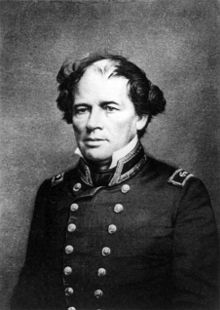Matthew Fontaine Maury | |
|---|---|
 as a U.S. Navy lieutenant in 1853 | |
| Born | January 14, 1806 |
| Died | February 1, 1873 (aged 67) Lexington, Virginia, U.S. |
| Resting place | Hollywood Cemetery |
| Nationality | American |
| Occupation(s) | Oceanographer, naval officer, educator, author |
| Military career | |
| Allegiance | |
| Service | |
| Years of service | 1825–1861 (USN) 1861–1865 (CSN) |
| Rank | |
Matthew Fontaine Maury (January 14, 1806 – February 1, 1873) was an American oceanographer and naval officer, serving the United States and then joining the Confederacy during the American Civil War.
He was nicknamed "Pathfinder of the Seas" and is considered a founder of modern oceanography. He wrote extensively on the subject, and his book, The Physical Geography of the Sea (1855), was the first comprehensive work on oceanography to be published.
In 1825, at 19, Maury obtained, through U.S. Representative Sam Houston, a midshipman's warrant in the United States Navy.[1] As a midshipman on board the frigate USS Brandywine, he almost immediately began to study the seas and record methods of navigation. When a leg injury left him unfit for sea duty, Maury devoted his time to studying navigation, meteorology, winds, and currents.
He became Superintendent of the Depot of Charts and Instruments, later renamed the United States Naval Observatory, in 1844.[2] There, Maury studied thousands of ships' logs and charts. He published the Wind and Current Chart of the North Atlantic, which showed sailors how to use the ocean's currents and winds to their advantage, drastically reducing the length of ocean voyages. Maury's uniform system of recording oceanographic data was adopted by navies and merchant marines worldwide and was used to develop charts for all the major trade routes.
With the outbreak of the American Civil War, Maury, a Virginian, resigned his commission as a U.S. Navy commander and joined the Confederacy. He spent the war in the Southern United States, and Great Britain and France as a Confederate envoy. He helped the Confederacy acquire a ship, CSS Georgia, while trying to convince several European powers to help stop the war. Following the war, Maury was eventually pardoned; he accepted a teaching position at the Virginia Military Institute in Lexington, Virginia.
He died at the institute in 1873 after he had completed an exhausting state-to-state lecture tour on national and international weather forecasting on land. He had also completed his book, Geological Survey of Virginia, and a new series on geography for young people.
- ^ Cite error: The named reference
CFapowas invoked but never defined (see the help page). - ^ Herman, Jan K. (1984). A Hilltop in Foggy Bottom: Home of the Old Naval Observatory and the Navy Medical Department. Naval Medical Department.